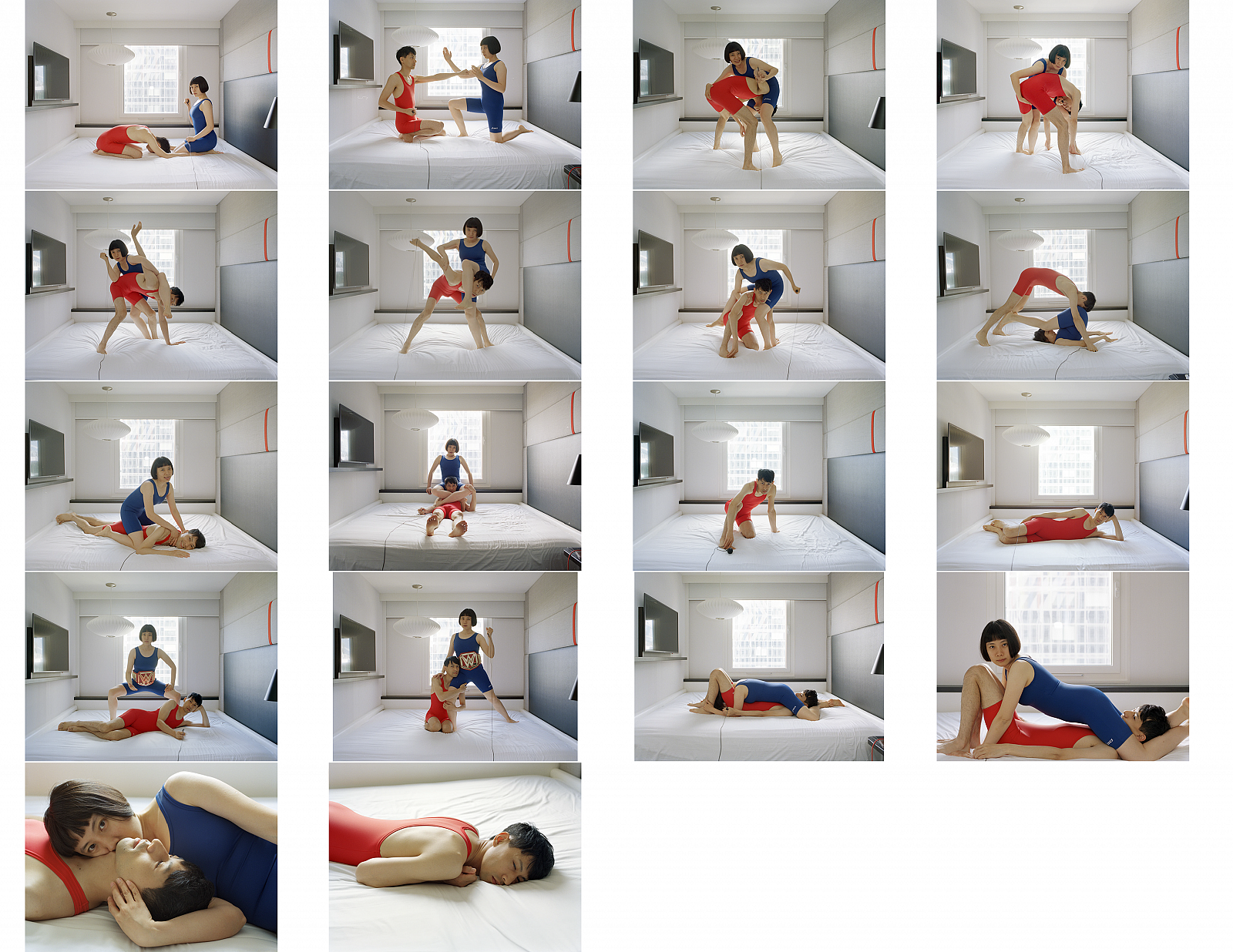Heichi: The Bed Wrestling series is on display in your current solo exhibition at Fotografiska New York, Your Gaze Belongs to Me. Two of the photographs are blown up, while nine others line another wall. Looking at them together, it feels likewatching an animated sequence, which in itself is a kind of action movie. How did the idea of wrestling first come to you?
Pixy Liao: I think what couples do in bed can be jokingly seen as a sport. Despite any love shared, couples can also be rivals and constantly indulge in battles with one another. To approach this intimate rivalry through the lens of sports, I find it in some ways quite similar to wrestling and sumo. Oftentimes in wrestling matches, the competitors end up in such bizarre yet intimate positions, almost inappropriate and at the same time tangled up in a mutual desire for dominance.
Heichi: Did you learn any standard wrestling moves for your shoot?
PL: I referenced a few moves from actual wrestling matches and was amazed by many of them, especially seeing them documented by camera. It’s hard to imagine these moves carried out by two complete strangers.
Heichi: Some people are pretty into those choreographed wrestling shows, where the wrestlers just hit each other with stuff…
PL: There’s something very special in the performative aspect of wrestling. In the U.S., professional wrestling organizations like the WWE implicitly glorify violence and enjoy wide popularity. Similarly, in All Japan’s Women Pro-Wrestling, the outcomes of most games are prearranged by the bookers; even the progress of the match is roughly scripted in advance. In a way, the booker is the director of theatrical production and the wrestlers come to the stage that is the ring and performs. The audience doesn’t know the outcome per se, but they’re clearly aware of the match’s choreographed nature. It is more about watching how a fake-by-default spectacle can be rendered as something real.
Speaking of women’s wrestling, I believe they have a huge male audience. Maybe seeing women fight each other is just irresistible. There are many settings specific to women’s matches, such as mud wrestling, where the wrestling ring is a mud pit. The wrestlers usually get extremely messy, their bodies completely drenched in mud and presenting a highly sexualized image.
I prefer matches that are not so clear-cut, and I particularly enjoy those stalemate moments. It’s hard to imagine how two strangers can perform moves like a chokehold that carry a sense of total control. The wrestler who manages to get a hold of the opponent in this move is thereby in full dominance, which is not unlike the power dynamics in a sexual relationship.
Heichi: Moves that guarantee victory like that are likely to be fake. In one of your photos, Moro does this pose where he prostrates himself as though in worship…
PL: That pose might go beyond the meaning of wrestling and come closer to what I’ve expressed in my other works: a sense of submission to women. These are my fantasies, where I imagine women being able to rival men both in terms of physique and social status.
** Interviewed by Qianfan Gu
Edited by Zian Chen and Mike Fu
Translated from the Chinese by Sixing Xu.
Born and raised in Shanghai, Pixy Liao is an artist currently residing in New York. Her long-term photo project “Experimental Relationship” challenges conventional ideas of gender dynamics. She also explores female identity in video and sculpture. She has participated in exhibitions internationally, including the Fotografiska, Rencontres d’Arles in Arles, Asia Society, National Gallery of Australia, etc. Her solo show Your Gaze Belongs to Me is now on view at Fotografiska in New York, till early September.
Sixing Xu is an artist working with sculpture and text. She graduated from Vassar College and is currently based in Beijing.
平行奥运 Olympic Reveries
In tandem with the Tokyo Olympics, Heichi Magazine is hosting a parallel assembly of artist essays. Olympic Reveries emphasizes the cultural spaces opened up by sports and the illusion of spatiotemporal unity created by live broadcasts. We invited artists to extend the ideas of athleticism and national culture into their practices and speculate on real or imagined games that present values different from those of mainstream sporting events.

